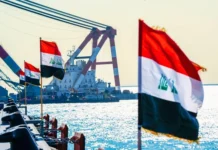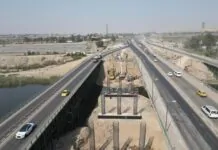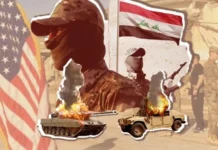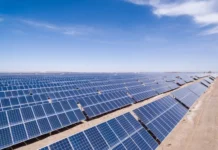Tishwash: Investment in Kurdistan and Iraq is on the agenda of Nechirvan Barzani’s meeting with Emirati diplomats.
Kurdistan Region President Nechirvan Barzani discussed investment opportunities in the Kurdistan Region and Iraq on Tuesday with the Chargé d’Affairs of the UAE Consulate General in the Kurdistan Region, Sheikha Bashir Farhan.
A statement issued by the Kurdistan Region Presidency, received by Shafaq News Agency, stated that, “On Tuesday, June 17, 2025, the President of the Kurdistan Region, Nechirvan Barzani, received Sheikha Bashir Farhan, the Chargé d’Affairs of the Consulate General of the United Arab Emirates in the Kurdistan Region, and discussed with her relations between Kurdistan and the Emirates.”
The statement added, “During the meeting, Barzani congratulated Sheikha on assuming her position,” expressing “his hope for her success and affirming the support and assistance of the relevant authorities in the Kurdistan Region to enable her to carry out her duties to the fullest extent possible.”
For her part, the Emirati official conveyed the greetings and appreciation of the UAE President, Mohammed bin Zayed Al Nahyan, and her country’s leadership to Barzani, stressing “the UAE’s desire to develop and strengthen relations with the Kurdistan Region,” according to the statement.
He pointed out that “the meeting addressed Emirati job and investment opportunities in Iraq and the Kurdistan Region, in addition to the latest developments in the region.” link
Tishwash: Parliamentary source: Al-Mandlawi is the prime suspect in the 2024 budget manipulation case
An informed parliamentary source revealed, on Wednesday, the involvement of First Deputy Speaker of Parliament Mohsen Al-Mandalawi in the case of tampering with the 2024 budget tables, indicating that there is a large financial difference of up to 15 trillion dinars between the tables sent by the government and those voted on by Parliament.
The source, who preferred to remain anonymous, told Al-Maalouma Agency, “The parliamentary investigations into the tampering with the 2024 budget tables were obstructed by the direct intervention of Mohsen Al-Mandalawi, who exploited his position as acting Speaker of Parliament at the time to pressure the investigation, due to his direct involvement in the case.”
He explained that “the investment committee asked the Finance Committee to provide it with all documents related to the financial tables, and the Finance Committee responded and provided what was requested, but the investigations were stalled and their results have not yet been revealed.”
The source stressed that “manipulating the schedules represents a serious violation, especially in light of the absence of final accounts, which opens the door to unaccountable financial transfers and gives multiple parties the opportunity to act without real oversight.”
It is noteworthy that economic experts had previously warned of the danger of manipulating budget schedules, given the lack of transparency and the failure to submit final accounts, which reinforces fears of systematic financial corruption within state institutions. link
************
Tishwash: Al-Sudani’s advisor reveals to “Tariq Al-Shaab” the procedures for dividing “Rafidain” into two banks.
The Iraqi banking sector continues to suffer from chronic deterioration and weakness due to accumulated financial failures, weak capital, and a host of other factors, hampering its vital role in supporting the national economy.
There is no doubt about the importance of reforming and developing the banking sector in Iraq, including Rafidain Bank, which constitutes the cornerstone of the country’s financial system and government payments system.
Conditions for successful structuring
Although this step is necessary, experts emphasize the need to implement it cautiously and gradually, while enhancing governance and transparency to avoid the risks of rapid privatization and prevent any political influence in the new management of the bank or elsewhere, thus ensuring the restoration of confidence among investors and citizens alike.
How is it structured?
In this regard, the Prime Minister’s Financial Advisor, Dr. Mazhar Mohammed Salih, stated that Rafidain Bank—one of the largest commercial government banks in Iraq—has previously suffered from accumulated failures that have posed a significant obstacle to its development, despite its status as the backbone of the government payments system.
In an interview with “Tariq Al-Shaab,” Saleh said, “Government and individual financial transactions have become largely intertwined, at a time when the bank suffers from weak capital, a near-total reliance on government liquidity, and limited international banking relationships.”
He pointed out that Rafidain Bank “alone accounts for approximately 60% of total banking assets in Iraq, which reflects its significant size and the importance of its reform within a broader framework for developing the country’s banking sector.”
He explained that “the study currently being prepared by Ernst & Young is moving towards separating the bank into two independent entities. The first, called Rafidain 1, will be a joint-stock bank open to citizen participation, with the government’s stake remaining below 25%, to avoid transforming it into a mixed-sector or fully private sector.”
He explained that “Rafidain 1” will be effectively integrated into the national and international banking environment, will be managed in partnership with a strategic banking partner (international or regional), and will rely on modern digital and financial technology. It will also work to finance foreign trade and enhance domestic investment, representing a qualitative shift in the structure of the Iraqi banking sector, which suffers from isolation between government and private banks.
He added, “The goal is to establish a bank that complies with international standards, is free from money laundering issues, and keeps pace with technological developments, thus contributing to improving the banking environment in Iraq.”
traditional Mesopotamia
The second entity, according to Saleh, will maintain the “traditional Rafidain Bank” as a fully state-owned bank, exclusively concerned with government financial operations. It will be the official banking arm of the state, responsible for managing the unified treasury account and all government payments.
He explained that “Rafidain 1, which will be privatized through a guaranteed process, will be completely separate from Rafidain 2, and will deal with the banking market and citizens as a major joint-stock company, with a strategic banking partner.” He noted that “the details of the capital, number of branches, size of assets, and the transformation mechanism will be precisely determined within the comprehensive study being prepared by the consulting firm, which is expected to be completed and submitted by the end of this year.”
Private sector involvement
For his part, economic expert Ahmed Abdul Rabbo stressed that “the restructuring of Rafidain Bank represents a crucial step in the process of reforming the Iraqi banking sector, but it requires careful and gradual implementation to avoid any negative repercussions.”
In an interview with “Tariq Al-Shaab,” Abd Rabbo explained that “successful restructuring must begin with comprehensive administrative and technical reforms, clearing the public budget of accumulated burdens, and strengthening the principles of governance and transparency.” He emphasized the need to “gradually involve the private sector without relinquishing the state’s strategic control over the bank.”
He warned of “the risks of rapid or random privatization, or selling assets for less than their true value, as well as maintaining government influence within the bank’s new management, all of which could undermine reform goals rather than achieve them.”
He continued that the success of this process “will contribute to restoring confidence in the banking sector, enhance the attraction of local and foreign investment, and improve the efficiency of the financial system as a whole.” However, he cautioned that “any errors in implementation could lead to financial or social crises that would be difficult to contain later.” link






